Dr. Ailin Oishi talks to the Ontario Chiropractic Association on embracing cultural norms into her practice. Photo courtesy: Dr. Ailin Oishi.
By: John Bromley, OCA
Special to Nikkei Voice
This article was reprinted from the Ontario Chiropractic Association’s initiative to celebrate Asian Heritage Month by highlighting various members, including Dr. Ailin Oishi, a Nikkei Voice contributor. To learn more, visit www.chiropractic.on.ca.
Ontario Chiropractic Association (OCA) member Dr. Ailin Oishi of Toronto’s Japanese Canadian community is actively involved in making heritage part of her health care delivery for potential and established patients with spine, muscle, joint, and related nervous system issues.
OCA asked Dr. Oishi to represent the Japanese Canadian community as part of its inaugural Asian Heritage Month initiative. Dr. Oishi represents the core elements of OCA members from a diverse heritage hold, and offers unique insights for raising awareness of chiropractic care in Ontario.
As a regular contributor to Nikkei Voice, Dr. Oishi provides a thought-provoking account of why Asian heritage is important for Ontarians to understand and how, as health practitioners, OCA’s diverse members approach patients when folding cultural norms into their practice.
What is Asian Heritage Month?
The Government of Canada designates May as Asian Heritage Month and calls it “a time to reflect on and celebrate the contributions that Canadians of Asian descent have made and continue to make to the growth and prosperity of Canada.” It’s been celebrated across Canada since the 1990s.
“Diversity represents one of Canada’s greatest strengths, and we strive to ensure that all Canadians can reach their full potential and participate in Canada’s civic life. Over the last two centuries, immigrants have journeyed to Canada from East Asia, Southern Asia, Western, Central, and Southeast Asia, bringing our society a rich cultural heritage representing many languages, ethnicities, and religious traditions. The people of this diverse, vibrant, and growing community have contributed to every aspect of life in Canada—from the arts and science to sport, business, and government,” states the official declaration of Asian Heritage Month.
“Asian Heritage Month offers all Canadians an opportunity to learn more about the history of Canadians of Asian descent and to celebrate their contributions to the growth and prosperity of Canada.”
As the Second World War ended, Canadians of Japanese descent were strongly encouraged to prove their “loyalty to Canada.” Although derived from postwar rhetoric, Dr. Oishi’s work directly reflects what it means to be a caring patriot, influenced by her family’s values for community life as first-generation Japanese Canadians. As with many role models, Dr. Oishi’s community work frequently explores race, gender, and cultural experiences.
We asked Dr. Oishi three salient questions about care delivery and pride in her community.
As an Asian Canadian, how did you find your way to being a chiropractor?
I was born in Kobe, Japan. My formative years were spent growing up in Japan, Taiwan, and all across the U.S. I grew up straddling two worlds, the East and the West. Instead of perceiving it as a barrier, I made it part of my identity by fusing the best parts of my Asian culture and heritage and North American upbringing and education.
In the early 90s, my family immigrated to Canada to escape the economic bubble collapse in Japan. We were looking for a better future. Becoming a Canadian citizen was the best decision we made as a family. My personal best decision was to pursue a career in chiropractic, helping people optimize their health. In 2004, I started a private clinic in Leaside with a focus on treating chronic pain and arthritis in the senior population, with a special interest in Temporomandibular Joint (TMJ) disorders, which are conditions that affect the jaw joints and surrounding muscles and ligaments. I like to challenge myself and learn new things.
When practising within your community, how does your heritage impact the delivery of care to your patients? Are there cultural norms you must consider when serving your community?
In my practice, when delivering primary care as a clinician, I can better connect with my patients in a welcoming and safe space. I have the unique perspective of being able to understand where they may be coming from. The key is making your patients comfortable enough to lower their barriers and trust you with themselves.
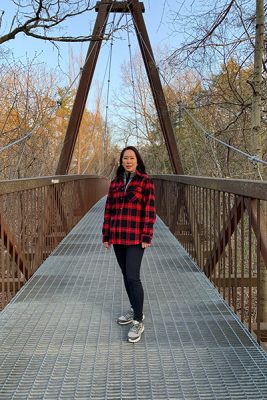
Dr. Ailin Oishi is following her own advice and taking a nature break, exploring the local trails. Photo credit: Dr. Ailin Oishi.
Culture is also a strong influence on health beliefs. In Japanese culture, politeness is a universal truth. A set of rules and social manners guide how you live and interact with others in your community. You are equally polite to strangers, friends, and family. Avoiding conflict, especially in the public eye, is key. Japan has a population of 126 million. With little personal space available, people need co-operation and respect to maintain social harmony and make life flow more smoothly.
Patients are reluctant to question and disagree with their doctor’s recommendations because it may be seen as disrespectful. The doctor is seen as an authority figure. The patient may refrain from asking questions, even if they do not fully understand the doctor’s instructions, because they don’t want to waste the doctor’s time. To avoid confrontation and maintain a harmonious patient-doctor relationship, the patient may leave their doubts and real opinions ambiguous or unspoken.
Overcoming this barrier, I am the first to ask questions to demonstrate that it is not embarrassing to clarify. It’s normal to have questions and doubts. It’s better to clear any potential misunderstandings and fears before it becomes something more. If you show others that you can be vulnerable by asking questions, they feel that they can also be open and less hesitant with you. This creates an open dialogue with shared decision-making rather than a top-down effect. You want an equal partnership with your patient regarding their health.
What brings you joy about your Asian Heritage?
Joy for me is celebrating my mixed heritage, as it uniquely provides me with a multi-sense of belonging. I try to serve the Japanese community as a health care provider and a volunteer. Helping seniors and giving back to the community is my current focus.
Take chronic pain in older adults. These patients will share their wisdom and life lessons with you if you are receptive. I learn as much from them as they learn from me. It’s a positive cycle. I help them understand how to live successfully with chronic pain. Do what you want to do with less pain and be positive!
We must celebrate being different instead of being afraid of it! As a woman and a visible ethnic minority, we face adversity from society. It has made me work harder and smarter to prove myself. We need to ensure that gender, race, and diversity are equally represented in the chiropractic profession and leadership to better reflect the patients and professionals we serve. That is our future.
***
See the OCA’s article here.







 16 May 2022
16 May 2022
 Posted by nikkeivoice
Posted by nikkeivoice 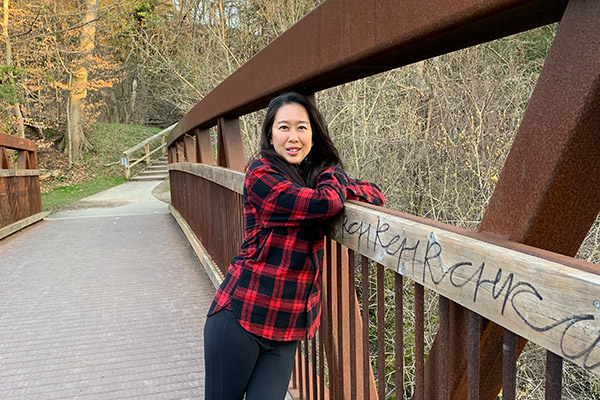





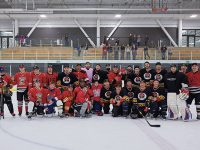
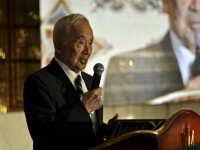

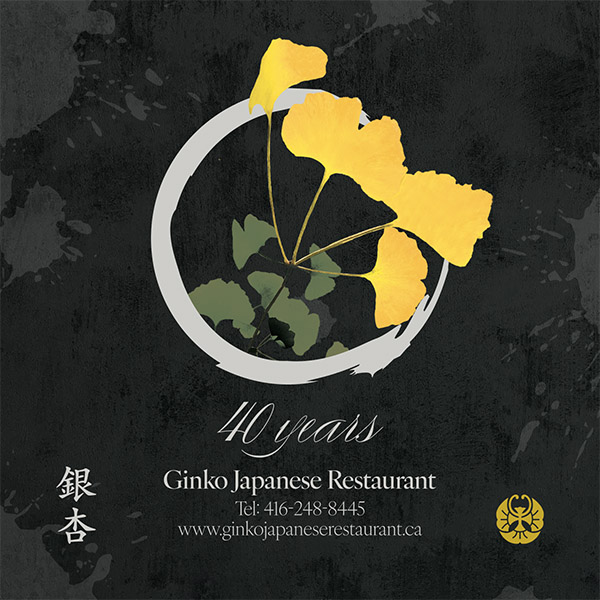
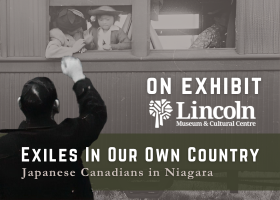
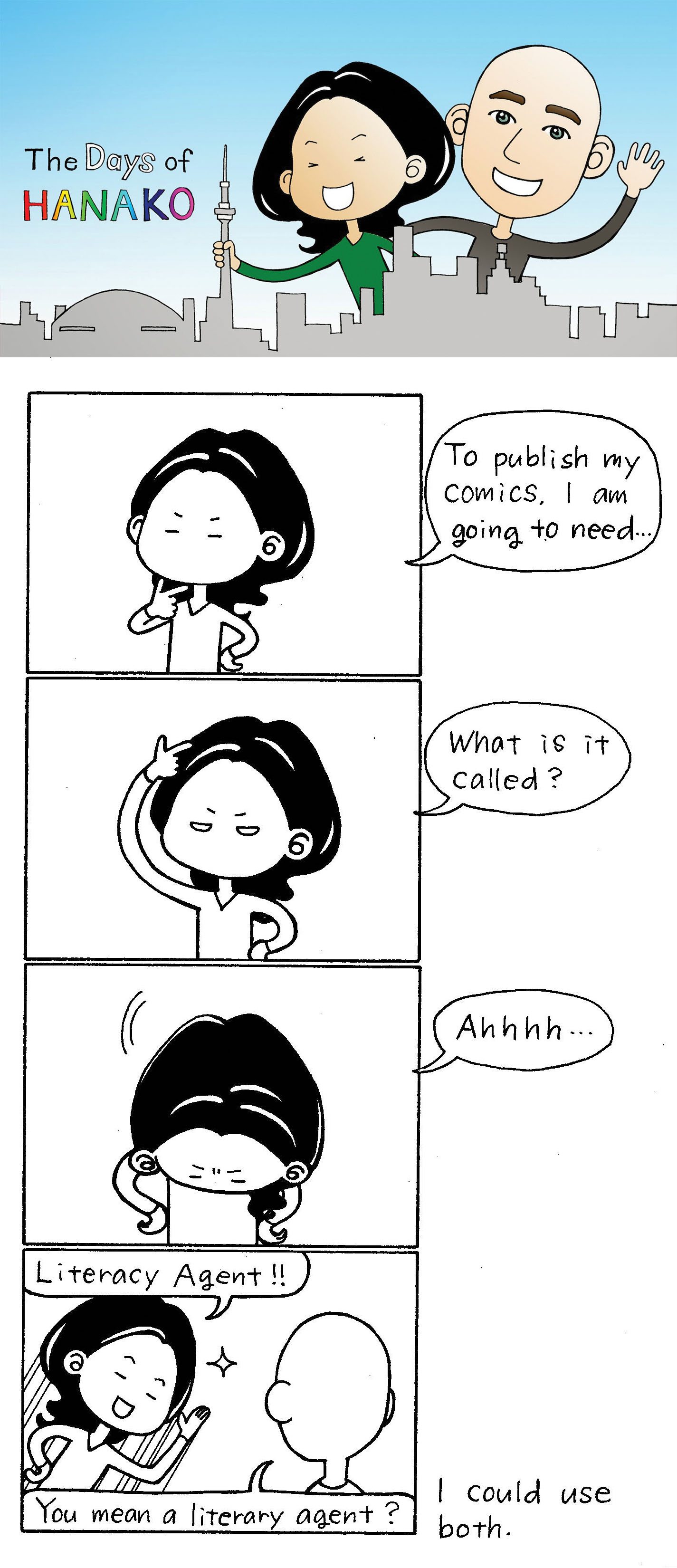
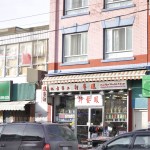
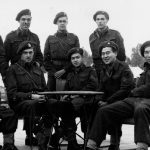

1 Comment
Dr. Ailin is skilled, intelligent and a blessing to be a part of health care practitioners
. Would highly recommend her for your care and well-being.
Indranie